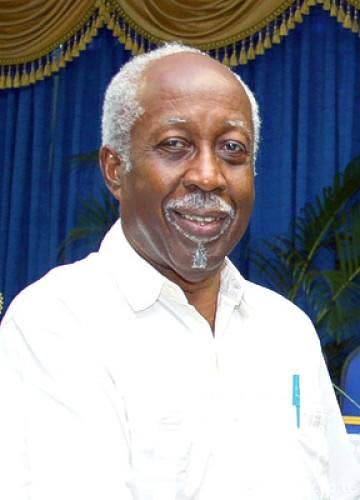Kenneth Lalla: a tribute

REGINALD DUMAS
THE FOLLOWING quotation is from an August 1999 article of mine about an incident that had occurred several years earlier when I was permanent secretary to the Prime Minister and head of the Public Service.
“I was asked to find a niche for a public servant who had just returned to the service after a one-year leave of absence...My dilemma was that no ministry at all wanted him, and yet he had to be placed somewhere. I discussed the matter with the relevant people and was confidently assured that, as head of the Public Service, I could assign him wherever in the service I wished – always provided, of course, that he suffered no loss of rank or emoluments. I followed this advice and assigned him to the Prime Minister’s Office (after obtaining the agreement of the Prime Minister).
“A few weeks later, I was on the carpet for my decision. The chairman of the Public Service Commission, Kenneth Lalla, was not pleased...He understood why I had taken the action I had, he said, and he knew that I had [followed] advice I had every reason to consider sound. However, the commission’s interpretation of section 121 of the Constitution was at variance with mine’s. The commission would not overrule me this time, but he did hope that I would in future be guided by the commission’s position.
“Section 121 (1) deals with appointments, etc of public officers. It says in part that ‘power to appoint persons to hold or act in offices to which this section applies, including power to make appointments on promotion on transfer and to confirm appointments...shall vest in the Public Service Commission.’
“Mr Lalla’s point was that although the word ‘assign’ did not appear in the section, the notion of assigning was subsumed in the word ‘transfer,’ and transfers were the business of the commission, not of anyone else. (Section 121 [6] does however make an exception to this rule. It grants authority to the Prime Minister to transfer a PS from one office to another such office carrying the same salary.)”
Kenneth Lalla, who has just left us, was perfectly correct; I was duly chastened. Ken was a soft-spoken man, courteous, with a kindly manner, but it would have been a mistake to interpret that as weakness. He was fair, but he was firm. His autobiography, I am a Dream to My Village, indicates the number and kind of pressures, personal and professional, which he had to face, and how he dealt with them. One episode brings to mind the English poet/playwright William Congreve: “Heaven has no rage, like love to hatred turned/ Nor Hell a fury, like a woman scorned.” To which I merely (perhaps cryptically?) add: “Neither Heaven nor Hell has venom like a politician thwarted.”
From his lengthy experience as chairman of both the Public and Police Service Commissions, and of the Defence Force Commission Board, and as a member of the Judicial and Legal Service Commission, Ken wrote an invaluable study on The Public Service and Service Commissions: Commonwealth Caribbean. It should be carefully read by public servants and trade unionists, yes, but there is also much in it for the enlightenment of ministers, attorneys, and, indeed, the general public.
In 2012 he published A Republic in Constitutional Transition, which he described as “a historical review of the transition of Trinidad and Tobago from a Crown Colony to an independent state…” If it were possible, the book should be required reading for all, given our unfamiliarity with our history.
My unwise “assignment” notwithstanding, Ken and I had got along well with each other during our Public Service years together, and we kept in touch afterwards. We last saw each other at his home in Valsayn, where I spent two delightful hours with him. He was then already over 90, and I was struck not only by the undimmed quality of his intellect but also by his physical energy. If I make it to that age, I remember telling myself, I want to be like that.
From the socio-economic disadvantages of his childhood, Ken steadily and successfully elevated himself with hard work, focus and vision. He became a Member of Parliament. His law practice flourished. His service commissions periods were reformist. But he never lost the common touch. He conscientiously exercised his responsibilities as a citizen. He was a devoted family man. And he clung like a limpet to principle and ethical behaviour. He was an exemplar. You cannot reasonably ask for more.
I greatly admired him, and I shall greatly miss him. My deepest condolences go to his widow and children. Their loss is profound, but so is ours.


Comments
"Kenneth Lalla: a tribute"